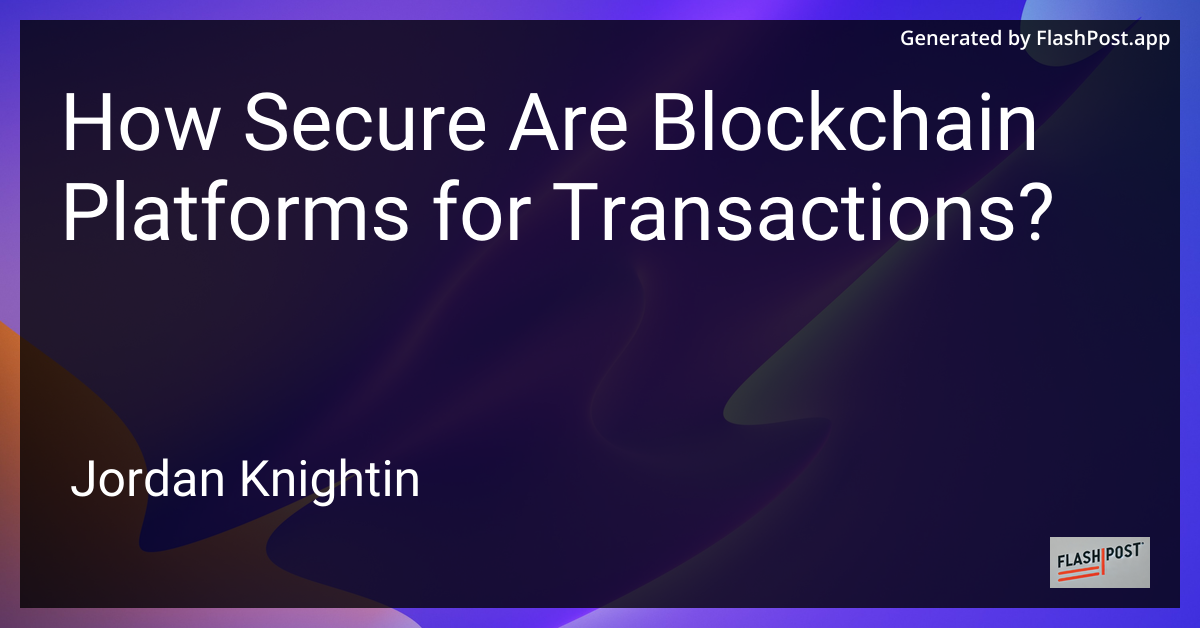

How Secure Are Blockchain Platforms for Transactions?
In the realm of digital finance, the rise of blockchain technology has been a game-changer. From cryptocurrencies to smart contracts, blockchain platforms offer a decentralized method of recording and verifying transactions. Given its growing prominence, it’s crucial to explore the security aspects of blockchain platforms for transactions. Let’s delve into how secure these platforms truly are.
Understanding Blockchain Security
At its core, blockchain technology is praised for its robust security features. One of the fundamental elements contributing to this security is its decentralized nature. By distributing data across a network of nodes, blockchain eliminates the single point of failure seen in traditional financial systems.
Cryptographic Security
Blockchain transactions are secured by cryptographic techniques. Each block contains a cryptographic hash of the previous block, a timestamp, and transaction data, making it nearly impossible to alter any data retroactively without the network’s consensus. This ensures the integrity and authenticity of the transaction records.
Consensus Mechanisms
Most blockchain platforms utilize consensus mechanisms like Proof of Work (PoW) or Proof of Stake (PoS) to ensure agreement among nodes on the network’s state. These mechanisms play a critical role in maintaining the security and trustworthiness of the blockchain, protecting it against double-spending and 51% attacks.
Potential Security Risks
Despite the inherent security features, blockchain platforms are not entirely immune to threats. Here are some risks associated with blockchain transactions:
- 51% Attack: If a single entity gains control of more than half of the network’s mining power, it can manipulate transactions. This highlights the importance of a decentralized network.
- Smart Contract Vulnerabilities: While smart contracts automate transactions, they are only as secure as the code they are built upon. Bugs or vulnerabilities within smart contracts can be exploited.
- Phishing and Social Engineering: Attackers may employ phishing tactics to steal private keys, which are crucial for accessing blockchain assets.
Enhancing Blockchain Security
Innovations in blockchain security are ongoing. Here are some ways to enhance the security of blockchain platforms:
- Advanced Encryption: Utilizing more advanced encryption methods can help protect transaction data and user anonymity.
- Regular Audits: Conducting frequent security audits and code reviews of smart contracts can mitigate vulnerabilities.
- Education and Awareness: Users should be educated about potential threats like phishing and secure key management practices.
The Future of Blockchain Security
As blockchain platforms continue to evolve, so too will their security measures. Researchers and developers are actively engaged in improving blockchain protocols to make them more resilient against emerging threats. This will be critical as blockchain becomes further embedded in the financial world. Read more about how blockchain is shaping the future of finance.
For enthusiasts and professionals looking to deepen their understanding of blockchain technology, exploring affordable blockchain books can offer valuable insights.
Moreover, gaining a clearer perspective on how cryptocurrency exchanges function is crucial for anyone engaging with blockchain trading platforms.
Conclusion
Blockchain platforms provide a revolutionary approach to secure transactions, grounded in decentralization and cryptographic principles. While challenges remain, ongoing innovations promise to bolster blockchain security, paving the way for its broader adoption. With vigilant practices and technological advancements, blockchain platforms will continue to be formidable players in the realm of secure digital transactions.
By staying informed and educated, users can harness the potential of blockchain technology while navigating its security landscape safely.
